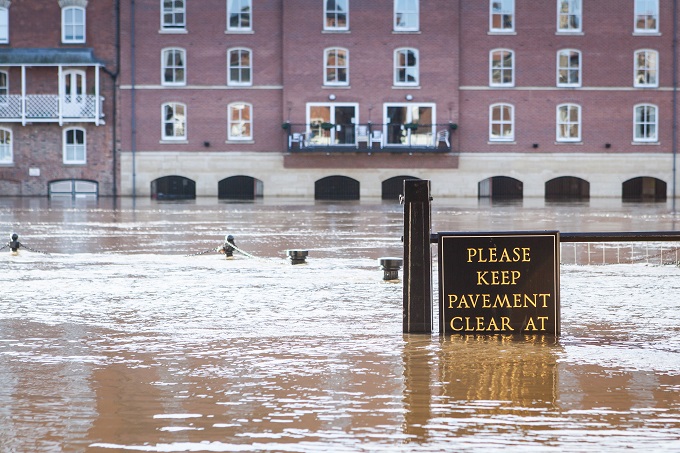What caused the record UK winter rainfall of 2013-14?
Author: Press Office
10:00 (UTC+1) on Thu 22 Jun 2017
Unusual conditions in the tropics and stratosphere gave rise to the very wet winter of 2013-14, in which there was damaging flooding in many parts of England.
Climate change made a secondary contribution by increasing the moisture holding capacity of the atmosphere.
The winter of 2013-14 will be remembered for many years for remarkably widespread and persistent flooding that affected many parts of England, including the low-lying Somerset moors and the Thames Valley.
Record rainfall levels
Rainfall between December 2013 and February 2014 smashed previous winter records in numerous regions – including for the UK as a whole and for Southern England. Some of these rainfall series extend back more than 250 years.
The seemingly unprecedented nature of events – and further exceptionally heavy rainfall and flooding in winter 2015-16 – has led to questions about whether the UK is beginning to witness a dramatic change in its climate.
In February 2014, the Met Office noted that weather patterns globally were unusual and that this could be linked to the very wet weather. Over the course of a season, even influences from the other side of the globe can change the weather experienced in the UK.
New study published
Today, in a study published in the journal Environmental Research Letters, a team of Met Office and University of Oxford scientists have looked in detail at global conditions in winter 2013-14. They conclude that weather conditions in the tropics and stratospheric wind patterns were largely responsible for creating the succession of winter storms that brought record rainfall. While all tropical regions appeared to have some influence, conditions in the tropical Atlantic sector look to have had a particularly important role.

Jeff Knight, the study’s lead author explains: “During winter 2013-14, there was very heavy rainfall over the Western Amazon - even greater than usual. This effectively created a disturbance to high-level wind patterns that propagated outwards from the tropics. At the UK’s latitude, it resulted in a southward kink in the jet stream that was very long-lived and brought storm after storm across the country.”
Study examines effect of stratospheric conditions on rainfall
The study also finds that conditions in the stratosphere – the layer of the atmosphere above the weather – had the effect of enhancing rain-bearing westerly winds over the UK. The stratosphere itself had particularly strong winds in winter 2013-14. The study’s authors also assessed the role of climate change on the rainfall in winter 2013-14 by making a reconstruction of historical rainfall based only on daily sea-level pressure patterns.
Jeff Knight said: “By comparing rainfall amounts and pressure maps for every winter day for the last century or so, we can work out what rainfall to expect from any given pressure pattern. Then we can see if the actual recorded rainfall is different to what we infer”. In fact, the analysis detects that UK winters with like-for-like pressure patterns have got wetter by about 8% over the last 100 years. The cause is the increase in the moisture carrying capacity of the atmosphere, linked to the warming of the globe over this period.
Did climate change play a part in the record rainfall?
Overall, this implies that climate change played a secondary role in making winter 2013-14 as wet as it was, providing about 10-15% of the excess rainfall. The very wet conditions in the UK were therefore mostly a result of unusual tropical weather and stratospheric winds.
The authors urge some caution about this finding, however. The global phenomena that they find are responsible may themselves be being affected by climate change. Furthermore, the analysis does not take account of any effect of climate change on the UK’s winter pressure patterns. If persistent low pressure patterns like those seen in winter 2013-14 are becoming more prevalent then the contribution of climate change could be significantly larger.
Assessing the way that pressure patterns could change in future is difficult because of the complexity of the dynamical processes involved. Nevertheless, follow up work to try to refine estimates of this aspect of climate change is now underway at the Met Office.


